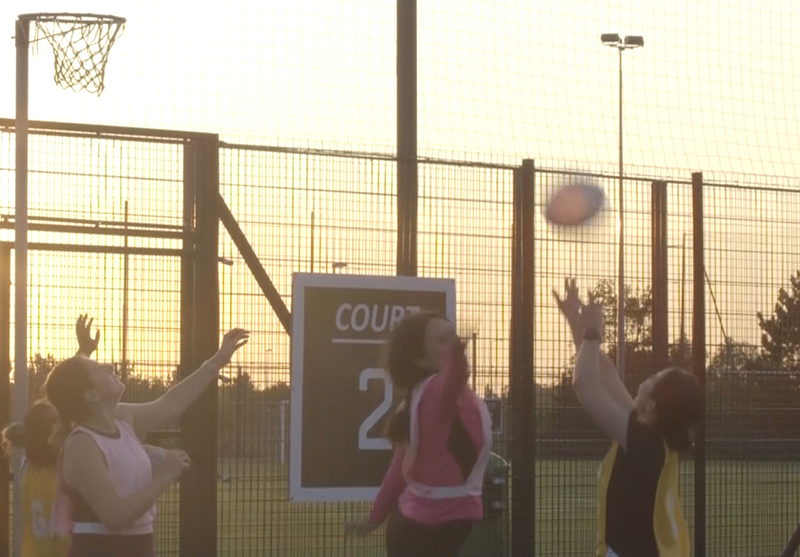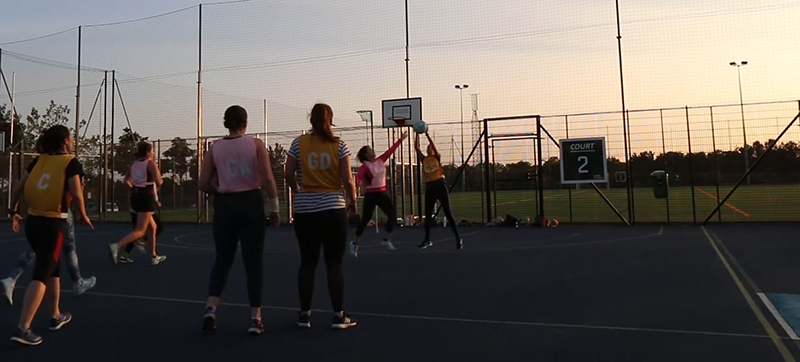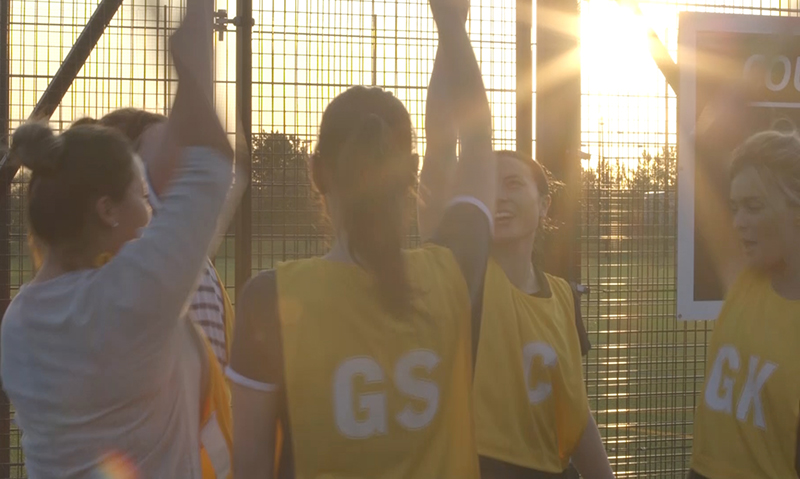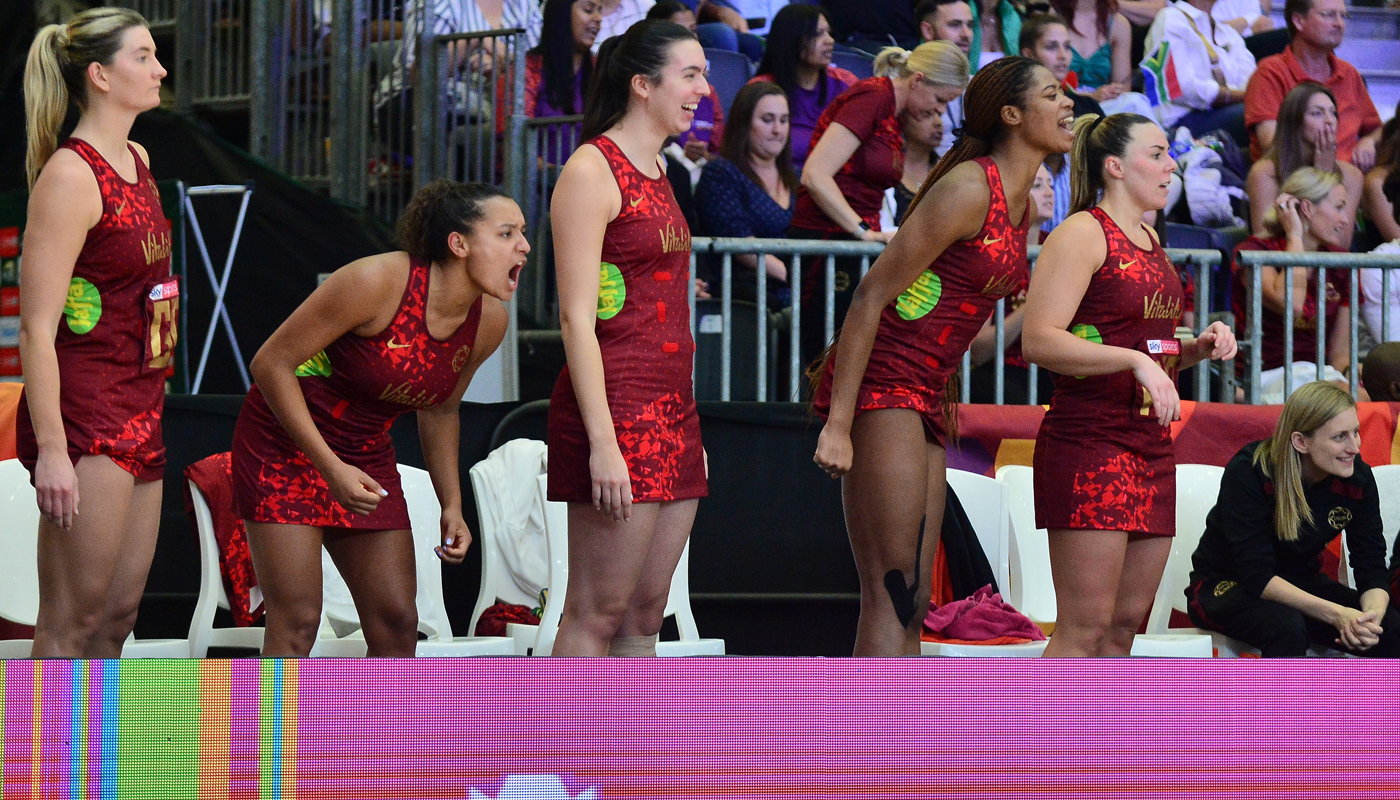Research shows that team-based sport not only brings about beneficial effects on physical performance, but also on well-being and motivation. Studies researching women’s well-being have reported maintaining social relationships as an important constant factor. This craving for social interaction also impacts activity choice, for example, team membership has been identified as one of the most important reasons why women engage in netball.
‘I was running and I joined a gym but to me it’s not the same as kind of running round on a netball court and you don’t get that scoring a goal or winning or losing or that team kind of feeling. It’s not the same when you just go for a run.’
These social connections and social networks and the benefits both of these bring about illustrates the role that team sport can play in the development of social capital – where individuals develop trust and cooperation to gain particular types of advantage.
 Team sport can be invaluable for some women.A photograph of people playing netball on a netball court. Someone is taking a shot in front of the netball hoop.
Team sport can be invaluable for some women.A photograph of people playing netball on a netball court. Someone is taking a shot in front of the netball hoop.
There is a growing body of research exploring
the benefits of team sport participation for women and in particular the link
to continued participation. For instance, one study
found that for a group of physically inactive Danish women, who took part in a
16-week programme of running or football, football led to the development of greater
social capital than running, which resulted in better social outcomes overall.
In addition, one year following the intervention it was only the team players
that had continued to play football at the local club. This reinforces the viewpoint
that the social context of team sport promotes adherence. The women who
participated in football also ranked having fun as a higher priority than those
in the running intervention, which may also help to explain greater adherence. Women
who play recreational netball have placed similar significance on the value of fun
and enjoyment that team sports
offer them.
‘I don’t like to just go and exercise. I like to be able to exercise but not have to think about it and do something fun at the same time.’
Older women ranging from 55-79 years have also cited social connection and a sense of belonging as important factors in their participation, where the commitment and community of being part of a team offered a unique and rewarding experience that encouraged continued participation. This was further supported by a study which found that the team sport of floorball (a Hockey-like team sport from Sweden, played indoors) provided greater motivation for middle-aged women than the activity of spinning, particularly intrinsic motivation, which is associated with continued participation. Women who have participated in team sports throughout their lives have been shown to develop an enduring relationship with competitive team sport.
 There are many advantages for playing netball.A photograph of people playing a game of netball on a netball court.
There are many advantages for playing netball.A photograph of people playing a game of netball on a netball court.
The most widely reported social and psychological health outcomes of participation in team sports include: emotional social support; sense of belonging; higher self-esteem; social network; and social interaction. In addition, investigations of the research surrounding continued participation concluded that there was ‘extensive support’ for the role of team sport in encouraging engagement and maintaining long-term participation in physical activity. This contrasts with the school of thought that participating in a team sport makes participation more difficult as it reduces an individual’s control, such as when and where they train, and the dates, times, and venues of fixtures.
Contrary to the belief that team sports lack flexibility, a study
of UK Back to Netball participants reported that the women overcame the
rigidness of team sport schedules by personalising their netball participation
through choosing the competition intensity at which they played, as well as
considering their own individual ability and competitive ambitions to inform
their choices. Research
with netball participants shows that being part of a team and the social
interactions involved drives their participation and enjoyment. Players compared
netball more favourably to keeping fit through individual exercise and the team
element as a key driver to maintain their participation.
‘I wanted to do a team sport so I didn’t let anybody down and it meant that I would have to go. I would have to train. I would have to turn up and there was no excuses. Whereas anything I’d done before that was all individual so if I didn’t fancy going for a run then I wouldn’t go...’
The evidence presented here suggests that it is the culmination of social connections and social networks experienced through team sports that have been shown to develop women’s social capital, which ultimately contributes to their continued sports involvement throughout the lifespan. Therefore, team sports such as netball, have an exciting and important role to play in the future of keeping women active.
 Netball can be a social lifeline for some.A photograph of people in netball bibs high-fiving on a netball court.
Netball can be a social lifeline for some.A photograph of people in netball bibs high-fiving on a netball court.


























Rate and Review
Rate this article
Review this article
Log into OpenLearn to leave reviews and join in the conversation.
Article reviews